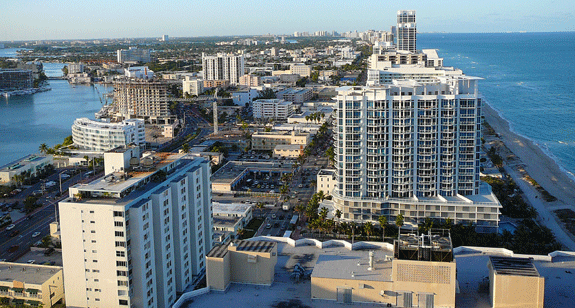The Miami Beach Commission late Wednesday took several long-anticipated steps to encourage development in the city’s North Beach neighborhood.
The commission agreed to raise height limits along 71st Street, agreed to the creation of a short-term or extended-stay rental district along a section of Harding Avenue, and set a six-month moratorium on demolitions in the area that would protect aging and architecturally significant MiMo buildings until local historic districts can be created that would prevent their demolition.
Height increases
Commissioners approved on a first reading a plan to allow height increases from 75 feet to 125 feet along 71st Street and some side streets located in the TC-1 district. The move is designed to encourage development along 71st Street and surrounding areas where city officials and planners are trying to create a town center for North Beach, which stretches from 63rd Street to 87th Street, and between the Atlantic Ocean and Biscayne Bay. The proposal was one of a series of recommendations steered by urban planners, Dover Kohl & Associates, which unveiled a master plan for the area in June.
Under the ordinance, buildings as high as 12 stories could be built in the area, with minimum setbacks of 10 feet for the first four floors, and minimum setbacks of 25 feet between the fifth and 12th floors.
The commission approved the measure on a 7-5 vote. Commissioner Kristen Rosen Gonzalez, who voted against the measure, called it premature and said no vote should take place before the commission formally approved the Dover Kohl master plan later this year. But other commissioners like Joy Malakoff said there was no reason to wait. “We need to get started,” said Malakoff. “Height increases will help the neighborhood, it’s going to [be] the hub of entertainment.”
Wednesday’s vote largely clears the way for the first large-scale development in the area. Developer Silvia Coltrane says she plans to build a 10-story, 175-room hotel with extensive ground floor retail that will include 150 parking spaces on 72nd Street.
Short-term rental district
The commission also took steps to encourage additional hotel-like development by voting 7-5 to approve a first reading of an ordinance that will create a short-term or extended-stay rental district along Harding Avenue from 87th Street south to 73rd Street.
The district is zoned RM-1, which currently prohibits rentals for periods of less than six months and one day, with few exceptions on Miami Beach. Backers of the ordinance, like Commissioner Ricky Arriola, said the measure would not only preserve buildings in danger of demolition, but will help tourist families who visit Miami Beach for extended stays. “This allows people to come and stay with kitchens and addresses a niche in the market,” he said.
The ordinance would allow for short-term rentals for weeklong periods in buildings that front Harding Avenue. Both developers and preservationists support the ordinance, who right now say there are no incentives for owners of the 37 buildings covered by the ordinance to preserve them – rental income derived from the buildings is not sufficient to cover the high costs of maintaining the older buildings, especially increasing insurance premiums related to the costs of sea-level rise, and because they are not suitable for multi-year rentals, they said.
Demolition moratorium
Commissioners also unanimously approved an immediate six-month demolition moratorium for North Beach to prevent any buildings from being torn down before local historic districts can be approved as part of the eventual master plan for the area.
Much of North Beach lies within a National Historic District, but buildings can only be protected from demolition if they situated inside a local historic district. On Wednesday, commissioners agreed to pass recommendations for the creation of local historic districts to the city’s historic preservation board, which must approve them.
